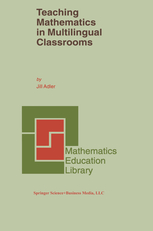 In this chapter, we draw substantially on Wenger’s (1998) Communities of Practice (CoP) theory to develop and then propose a methodological approach for analysing pre-service mathematics teacher education multilingual classrooms. The approach emerged in Essien’s (2013) study that investigated how pre-service mathematics teachers were being prepared to teach mathematics in multilingual contexts. Like many others in mathematics education, the theoretical frame for the study drew from a disciplinary domain in the social sciences to investigate the teaching and learning of mathematics. But why Wenger, and his theory of learning through participation in a community of practice, particularly given that Wenger’s CoP theory was developed from studying informal learning settings?
In this chapter, we draw substantially on Wenger’s (1998) Communities of Practice (CoP) theory to develop and then propose a methodological approach for analysing pre-service mathematics teacher education multilingual classrooms. The approach emerged in Essien’s (2013) study that investigated how pre-service mathematics teachers were being prepared to teach mathematics in multilingual contexts. Like many others in mathematics education, the theoretical frame for the study drew from a disciplinary domain in the social sciences to investigate the teaching and learning of mathematics. But why Wenger, and his theory of learning through participation in a community of practice, particularly given that Wenger’s CoP theory was developed from studying informal learning settings?
The theoretical journey that led us to Wenger began in a situated frame to enable us to bring to the fore the multilingual context in which pre-service mathematics teacher education in South Africa occurs, and in which prospective teachers will teach (e.g., Brill, 2001). We soon realised, however, that cognition was central to this work. Our concerns, however, were more with teaching and learning practices in teacher education, and not teacher educator thinking. Given our interest in foregrounding multilingualism, and our orientation to this as a resource and not a problem (Adler, 2001), we went on to explore the potential of sociolinguistic theory (Eggins, 2004) for this study. This more discursive approach brought with it a detailed focus on classroom discourse, backgrounding the classroom community as we came to view it. It was through this process of engagement with a range of theoretical resources with potential to illuminate language practices in mathematics teacher education in a context of multilingualism, (coupled with pilot empirical work in teacher education institutions), that we came to appreciate multilingual mathematics teacher education classrooms as complex communities. Such classrooms have diverse participants, roles and motives, and so we returned to our initial orientation to learning and teaching as situated. Hence we drew instead on Wenger and his more explicit and stronger social situative/practice theory, together with others who have argued its salience for studying teacher learning.
15
Mar
2016